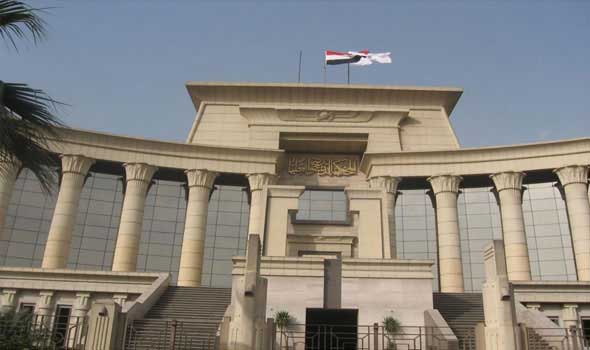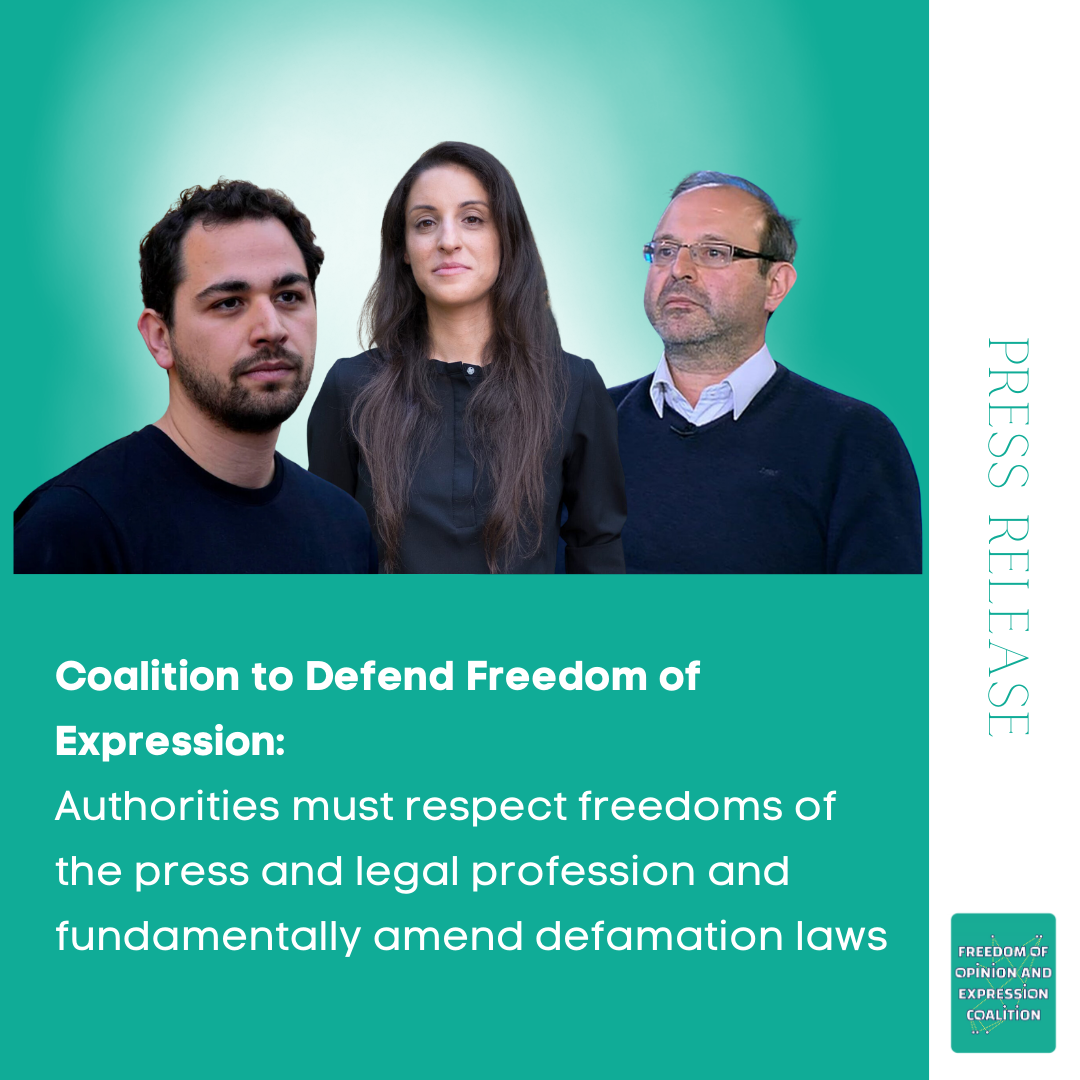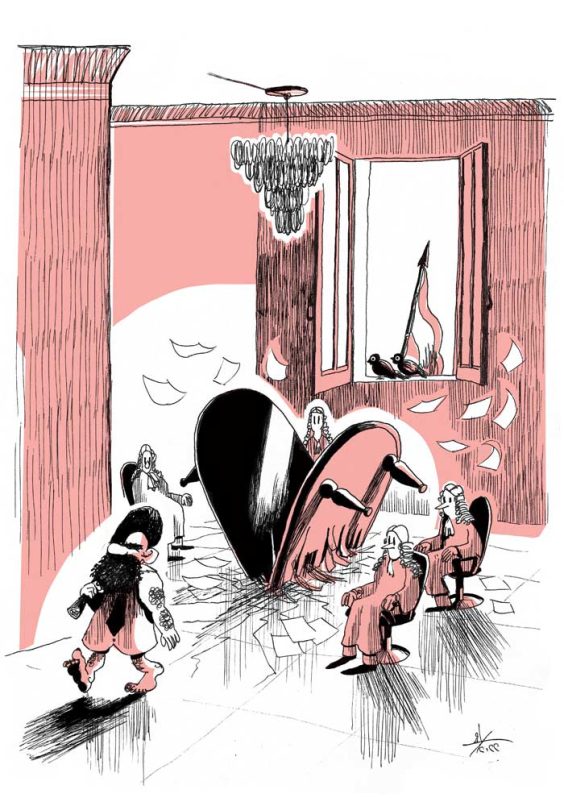Egypt’s Supreme Administrative Court: Striking is a Right, Not a Crime

On June 17, 2017, the Supreme Administrative Court in Egypt, presided over by Advisor Muhammad Mahir Abu al-Aynayn, issued a ruling sketching for parliament the controls for legally regulating strikes in the public service sector. The ruling followed the issuance of several contradictory rulings, some of which deemed striking a criminal and disciplinary offense. In this article, I shall briefly refer to the existing legal texts and judicial precedents related to the matter, and then review the current ruling and its bases and the controls it established to regulate the right to strike peacefully.
First: The Current Legal Regulation of Striking
Article 124 of the Penal Code punished public servants and contractors who go on strike with imprisonment and a fine as a main penalty. They were also dismissed from office or service as an obligatory supplemental penalty. After the “bread riots” of January 1977, Decree Law No. 2 of 1977 was issued. It punished employees who intentionally go on strike, either in agreement with each other or to achieve a common aim, whatever the aim may be, with hard labor for life. As this criminalization contravened the Constitution because of its loose phrasing and deviation from the principles of legally formulating penal texts, it was repealed by the decision issuing Law No. 194 of 1983.
The State Civil Servants Law No. 47 of 1978 did not regulate striking. After the revolution of January 25, 2011, the Supreme Council of the Armed Forces issued Decree Law No. 34 of 2011, which criminalized transgression on the freedom to work. The situation did not change with the issuance of the new Civil Service Law No. 81 of 2016, which did not put legal controls on peaceful striking by public servants. Hence, striking by public servants is still in need of legal regulation as per Article 15 of the current Constitution. The court rulings that have been issued since the promulgation of this Constitution in 2014 have called for such regulation.
As for Labor Law No. 12 of 2003, amended by Law No. 102 of 2008, it regulated the right to strike peacefully in the private sector. Article 192 of this law stipulates that workers have the right to strike peacefully, and that the announcement and organization of such strikes must occur through their syndicate organizations and be for the sake of defending their occupational, economic, and social interests. According to the law, strikes must occur in accordance with the boundaries, controls, and procedures that it established. Articles 193 and beyond of the Labor Law stipulated the controls on striking whose violation results in disciplinary punishment.
However, striking in Egypt is not solely governed by domestic law; rather, it is also regulated by the International Covenant on Economic, Social and Cultural Rights (ICESCR). Egypt ratified the ICESCR on December 8, 1981, and promulgated it in the Official Gazette on April 8, 1982, such that it became an Egyptian state law on April 14, 1982. According to Article 93 of the new Egyptian Constitution, the international agreements, covenants, and conventions that Egypt ratifies have the force of law after they are promulgated in the Official Gazette. Article 8 of the ICESCR stipulates that: “The States Parties to the present Covenant undertake to ensure: … (d) The right to strike, provided that it is exercised in conformity with the laws of the particular country.” The effect of this text is that the Egyptian state is obliged to grant workers the right to strike peacefully, which domestic law regulates by establishing conditions and procedures that must not restrict it in a manner that derogates from it, or renders it ineffective (as per Article 92 of the Constitution).
The new Egyptian Constitution contains a single article establishing the right to strike peacefully and enabling the law to regulate it. Some may see the wording of this article as laconic, but it establishes a constitutional right and obliges parliament to issue the law regulating it. Before this law is issued, striking is a legitimate right of state workers that is subject to no restrictions except for the general rules against abusing any rights, pursuant to the principle that whatever is not prohibited is permissible. The present Supreme Administrative Court ruling, which followed several rulings –some of which held that striking is prohibited to state workers– goads parliament toward fulfilling its constitutional obligation to pass the legislation that regulates the right to strike peacefully in a manner that does not undermine its foundation or essence.
Second: The Judiciary’s Indecisive Stance on Striking
In 1986, train drivers in Greater Cairo went on strike, making legitimate occupational demands related to their rights and the safeguards they enjoy while working. However, because the strike was limited to the train drivers in Greater Cairo, it was quickly broken and some of the strikers were brought before the Supreme State Security Emergency Court in Cairo on the charge of striking.
However, the Cairo Criminal Court (convened in the form of the Supreme State Security Emergency Court) issued a historic ruling exonerating all the accused persons in the case, on the basis that the ICESCR had become an Egyptian legislation when the Egyptian state ratified it and promulgated it in the Official Gazette as per Article 151 of the 1971 Constitution. The State Security Emergency Court held that when the ICESCR had become a law in effect in Egypt, Paragraph D of Article 8 implicitly abrogated Article 124 of the Penal Code. In this ruling, the court held that: “Whereas pursuant to Article 151 of the [1971] Constitution and to established doctrine and jurisprudence, the international conventions issued in accordance with the established constitutional principles and promulgated in the Official Gazette are considered state laws that the national judiciary must apply as such. Since it [i.e., the ICESCR] succeeded the Penal Code, Article 124 [of the Penal Code] must be considered to have been abrogated by Paragraph D of Article 8 of the aforementioned agreement as per Article 2 of the Civil Code”.[1]
Despite the issuance of this criminal court ruling in 1986 under the state of emergency, the Supreme Administrative Court did not adopt this rights-based orientation in the ruling that its Fourth Circuit issued on April 18, 2015. The court denied the right of workers to strike as established in the international human rights conventions and the Egyptian Constitution. It decided to punish strikers based on Sharia law, which the ruling deemed a restriction on the rights established in the international agreements. Sharia law, according to the ruling, does not allow the interests of people to be disrupted via a refusal to work. The court concluded that striking is a criminal and disciplinary offense and, after establishing the veracity of the Administrative Prosecution’s allegations that the employees went on strike and disrupted the public service’s ability to serve citizens’ interests, punished these employees.
In its grounds, the ruling referred neither directly nor indirectly to Article 15 of the 2014 Constitution, which recognized the right to strike. Similarly, the ruling cited Islamic jurisprudential rules that cannot be considered provisions of Sharia law. Moreover, this ruling assigned no weight to the international agreements to which the Egyptian state has committed. The reservation [that Egypt added] to the ratification instrument [of the ICESCR and that stated that Egypt only accepts the covenant to the extent that] it does not conflict with Sharia law does not exempt the Egyptian state from this commitment. Sharia law did not regulate the issue of striking with explicit texts that are indisputable in their meaning and authenticity, for striking is neither prohibited nor criminalized by the Quran or Sunnah. Also, note that the ruling provided political direction –an unusual occurrence in court rulings– to public servants; they are obliged to ensure that their conduct shows their loyalty to the state and to the existing regime of governance. At a minimum, they should not attack the state regime and the state’s social philosophy; and, they should not take any action that jeopardizes the state’s reputation or that could undermine the integrity of, or defame the regime.
In the absence of legislative regulation of striking by civil workers of the state, the jurisprudence of the disciplinary courts, the Supreme Administrative Court, and the Fatwa and Legislation Department in the State Council –with regard to the legality of striking– is varied and contradictory. The Supreme Judicial Court recently ruled to terminate a number of State Council employees because they went on strike and cut the electricity to a number of courtrooms, thus obstructing work. A legal opinion issued by the general assembly of the Fatwa and Legislation Department regarding the legality of strikes by doctors held that the health system provides vital services to citizens, so the restrictions on striking therein must be more stringent than those imposed on other areas of public service and may sometimes go as far as a complete ban.
Similarly, on July 25, 2015, the Supreme Administrative Court, presided over by Advisor Labib Halim, issued a ruling holding that the civil service laws that apply to governmental public jobs do not allow strikes that conflict with the continuity of public services. In this ruling, the court denied the legal status of the international agreements that the Constitution itself specified. It decided that the mere stipulation of the right to strike in an international agreement is not enough to allow it to be exercised. Rather, a law establishing the restrictions and controls outlining how the right can be used must be issued so that it is not misused as an instrument for destruction, and for sabotaging the national economy. Consequently, in the absence of a regulating law, striking is prohibited by default. This notion violates the general principles that require permitting whatever is not legally prohibited.
Given the legislative failure to regulate striking in the new Civil Service Law, parliament must regulate the right to strike peacefully by amending this law or issuing a dedicated law. It must do so by drawing on the experiences of democratic countries and the principles that Egyptian court rulings have established, and in a manner that does not conflict with Egypt’s international obligations or its Constitution which recognizes the right to strike. In this regard, the Supreme Administrative Court ruling in question is akin to a roadmap that lays down controls for regulating the constitutionally enshrined right to strike, so that they are under the noses of parliamentarians should they endeavor to develop a law that does so.
Third: The Supreme Administrative Court’s New Ruling
The Supreme Administrative Court’s ruling on June 17, 2017, established an important judicial principle; namely, that striking is a right whose use may not be punished even if the legislature has not regulated it. Pursuant to this principle, in February 2014, the court exonerated 17 employees of the charge of striking who work in the post office in Ashmoun in the Monufia governorate. To deduce the new principle, the court cited the following bases in the grounds of its ruling.
1. The Constitution stipulates the right to strike in Article 15, and obliges the legislature to regulate this right. However, the legislature has not intervened to regulate striking in the public service sector;
2. The case documents revealed that the accused employees did not overstep the boundaries of the use of the right to strike. They went on strike for the sake of legitimate, job-related demands, such as increasing allowances and incentives. Moreover, the administrative party actually responded to them, increased the incentives, and counted the strike days off their regular vacation days. Hence, the employees cannot be punished for using a right that the Constitution established;
3. It was not established that the employees abused the right to strike. It was established that the strike was partial –business in the post office continued as usual– and the administration testified that the strike was occupational and had no connection to any political organization. Hence, there was no cause to discipline them; and
4. It cannot be said that as long as the legislature has not regulated this constitutionally permitted right, its use must be prevented, for that would entail unacceptably suppressing a right stipulated by the Constitution.
The court implored the legislature to intervene to regulate striking. The Labor Law included regulation of the right to strike [in the private sector], so the legislature must now intervene to regulate this right in the scope of civil service in a manner that strikes a balance between this right; and, ensuring that it is not abused or derogated from, on the one hand, and the continuity of public services in a regular and steady fashion, on the other.
The court did not overlook its pioneering social role in the absence of legislative regulation. It placed in front of parliament the controls the abidance by which it saw as essential for a peaceful strike to be unpunishable. The controls include the following.
1. The demands for which the strike was organized must be legitimate and related to public service, and must not have a political character;
2. The employees must first resort to the administrative party via legitimate legal means for carrying out these demands. These include making complaints, and addressing public authorities and negotiating with them;
3. The administrative party must be informed within a sufficient amount of time before the strike, and it must be given a period to investigate and respond to the demands;
4. The strike must begin gradually. It must be partial before it becomes compressive;
5. There must be alternatives for handling urgent cases that cannot be disregarded via a strike, so that citizens’ interests are not disrupted. The legislature may also determine the jobs wherein striking is not possible because of their direct connection with the functioning of public services, and the interests of citizens; and
6. For a strike to be peaceful, and not tied to any kind of violence.
In summary, this important ruling establishes a roadmap that directs parliament toward regulating the constitutional right to strike peacefully, and in a manner that does not suppress it. The roadmap guides parliament toward the controls and rules that it must pursue to prevent the right to strike from being abused and from being stripped of its substance, and subsequently from being subject to claims of unconstitutionality.
Pending parliament’s regulation of the right to strike peacefully, the strike in question is permitted as a constitutional right that cannot be punished if the people exercising it respect the general controls that prevent its abuse. Not inflicting a penal punishment is supported by Article 60 of the Egyptian Penal Code, which stipulates that: “The provisions of the Penal Code do not apply to any act committed with good intent in accordance with a right established under the law” (in this text, “law” means all legislations that establish rights for individuals, whether they be constitutional, legal, or regulatory texts). Not inflicting disciplinary punishment is supported by the following fact: using the right to strike, in accordance with the controls drawn up by the judiciary in the absence of a regulatory legislative text, or the controls established by the legislation once it has been issued does not constitute a breach of job duties on the part of the employee; and, thus, it is not a disciplinary offense warranting punishment.
This article is an edited translation from Arabic.
_____
[1] Article 2 of the Egyptian Civil Code pertains to the explicit and implicit abrogation of legislation.



